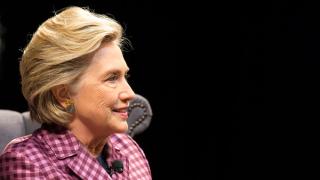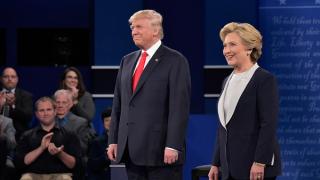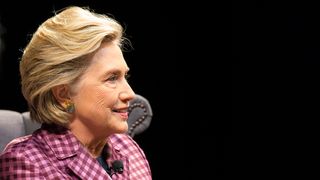This is a moving book in which the defeated Democrat, Hillary Rodham Clinton, muses on the outcome of last year’s US presidential election. It’s about the success of Donald Trump as well as her failure to win. What Happened displays Clinton’s vulnerabilities in sometimes painful and personal recollections, ones born of toxic moments.
Following Trump’s inauguration, reportedly described by former Republican president George W. Bush as “some weird shit”, the Clintons attended lunch at the Capitol. “Congressman Ryan Zinke, soon to be Trump’s Interior Secretary, brought his wife over to say hello,’’ Clinton writes.
This was somewhat surprising, considering that in 2014 he had called me the “Antichrist”. Maybe he’d forgotten, because he didn’t come equipped with any garlic or wooden stakes, or whatever one uses to ward off the Antichrist. But I hadn’t forgotten. “You know, Congressman,” I said, “I’m not actually the Antichrist.” He was taken aback and mumbled something about not having meant it. One thing I’ve learned over the years is how easy it is for some people to say horrible things about me when I’m not around, but how hard it is for them to look me in the eye and say it to my face.
US politics is a hard school, where diplomas are not awarded easily or granted with respect. What Happened is a revealing account of Clinton’s presidential campaign, from optimistic entry to devastating exit. The book is insightful and instructive and, despite her critics, the former secretary of state has produced a memoir that displays a readily apparent honesty.

The main obstacle confronting Clinton and the Democrats last year was that it was a “change” election year in the American cycle. This is a reference to the salient reality in US politics that it is extraordinarily difficult for the party holding the White House for the previous two terms to win a third. In the 20th century, it happened only five times: 1908, 1928, 1940, 1948 and 1988.
But the opinion polls — with the consistent exception of the Los Angeles Times, which other analysts dismissed as an outlier — suggested strongly that a Clinton win was probable if not certain. And the demography seemed to favour the Democrats, with a growing Hispanic population, which usually voted heavily in favour of Democratic candidates, becoming increasingly significant in battleground states.
No less an analyst than George F. Will, a Republican who fell out early with Trump, drew attention to the fact that, since 1992, the Democratic presidential nominee had routinely won more than 240 of the 270 electoral college votes required for victory. A win in Florida alone would be sufficient to deliver the White House. This assessment framed much of the analysis.
But this Democratic majority depended on the so-called Blue Wall of the midwest and upper midwest, consisting of the states of Pennsylvania, Ohio, Michigan and Wisconsin. They had been reliably Democratic in most contests but last year saw the phenomenon of Trump bulldogging through the Republican primaries and, post Bernie Sanders, bringing a combative populism to the general election.
While recent research from academics at Vanderbilt University has concluded Trump’s coalition of support looked similar to traditional Republican cohorts, there is no doubt that his economic nationalism, disrespect for minorities, disdain for the Washington establishment, crude authoritarianism and contempt for the media resonated with some Americans who believed the elites had ignored or forgotten them in social, cultural and economic terms.
In this, Clinton did not always help her cause. Consigning core Trump supporters to the dustbin of history as “deplorables”, she slipped badly and confirmed what too many working-class voters already thought of her.

Campaigning with a friend, congressman Tim Ryan in Columbus, Ohio, the candidate declared: “So, for example, I’m the only candidate who has a policy about how to bring economic opportunity using clean renewable energy as the key into coal country. Because we’re going to put a lot of coalminers and coal companies out of business, right Tim? And we’re going to make it clear that we don’t want to forget those people.”
Unsurprisingly, only the words about putting coalminers and coal companies out of business survived as a media grab, to be replayed ad nauseam throughout the campaign. Clinton apologised and returned to campaign in coal country. But the damage was irreparable.
Clinton’s campaign team may have understood the electoral data and prioritised their efforts but their ability to persuade undecided voters was surprisingly weak. Against Trump’s ringing call to “Make America great again”, the Democrats offered only the anodyne “Stronger together”. When Trump seductively asked his angry supporters at rallies, “What have you got to lose?”, Clinton had no sharp or convincing response. The Democrats simply backed a unifying and compelling theme and message.
We should perhaps dispense with the canard that Clinton blames everyone but herself for the loss. She does not walk away from her failings: as she told Christiane Amanpour on CNN, she takes “absolute personal responsibility”. She writes:
Why did I lose? Sometimes it’s hard to focus on anything else. I go back over my own shortcomings and the mistakes we made. I take responsibility for all of them. You can blame the data, blame the message, blame anything you want — but I was the candidate. It was my campaign. Those were my decisions.
Clinton has harsh words for some of the major players in US politics, including sections of the media, which displayed an obsession with her private emails. Even The New York Times is called to account, despite its endorsement.
Vladimir Putin and the Russian intelligence services are also credited with hacking the Democratic campaign machinery and spreading destructive and malicious fake news, often in a close working alliance with WikiLeaks. Clinton has every reason to see the self-important Julian Assange as an enemy.
As for Clinton’s justifiable questions about Trump’s obvious affections for Putin and desire for closer ties with Russia, we may safely speculate and leave the final determination to the dogged Robert Mueller, the former FBI director now heading the investigation into possible Russian interference in the election.
Clinton reserves special reproach for another former FBI boss, James Comey, particularly for reopening of the private email server inquiry just days out from the poll. Momentum is everything in a political campaign, especially as the electoral razor wire approaches. Comey’s actions are perhaps defensible, given political pressures from congress. But the leaks from the FBI to the Trump campaign, particularly to former New York mayor Rudy Giuliani, are not.
Throughout What Happened, Clinton is sustained by her faith, reflected in biblical quotes, of which she is fond. And her family, husband Bill and daughter Chelsea, are of great strength to her. Of Bill, she writes: “I thought for the ten millionth time how glad I was that I had married my best friend and biggest cheerleader.”
Few experiences in life are as soul-destroying as electoral rejection. Clinton may have won the popular vote, but the electoral college recorded her campaign as lost.
Michael Dukakis, beaten by George HW Bush in 1988, once asked George McGovern, defeated by Richard Nixon in 1972, when losing the presidential contest stopped hurting. “When that happens, Mike, I will tell you,” McGovern replied.
Clinton’s defeat hurt. And in this book, she is not afraid to write about it. What Happened may be her story, but it deserves to be read widely.
What Happened by Hillary Rodham Clinton is published by Simon & Schuster.






